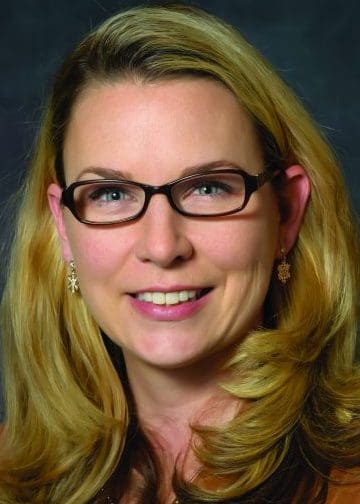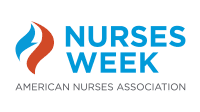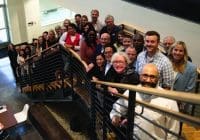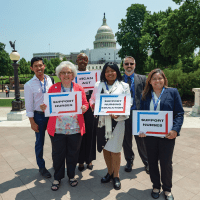Nurses—vital to a healthy environment and patients
 In the summer of 2022, my family and I happily vacationed in Alaska—a trip of a lifetime. The majestic beauty of Denali National Park and Preserve and its vivid and vibrant flora and fauna absolutely awed us. Beside this stunning display of nature at her best, however, we bore witness to the accumulating effects of climate change: mold-filled homes, now disintegrating like the permafrost on which they rest; swaths of spruce forests dying due to invasive beetles; millennia-old glaciers retreating up the valleys they forged.
In the summer of 2022, my family and I happily vacationed in Alaska—a trip of a lifetime. The majestic beauty of Denali National Park and Preserve and its vivid and vibrant flora and fauna absolutely awed us. Beside this stunning display of nature at her best, however, we bore witness to the accumulating effects of climate change: mold-filled homes, now disintegrating like the permafrost on which they rest; swaths of spruce forests dying due to invasive beetles; millennia-old glaciers retreating up the valleys they forged.
Alaskans aren’t alone in experiencing signs of climate change—we’re all seeing its effects. Frequent and repeated extreme flood, fire, and snow events. Record heat and cold waves. Drought-driven crop failures and water restrictions. Compromised air quality from smoke and dust. The list goes on.
Nurses, as members of our communities, have experienced these impacts and more. Our homes have flooded and burned. We’ve escaped tornadoes and sheltered during storms. Some of us have developed asthma and allergies or experienced worsening symptoms.
Nurses speak up about climate change
Global climate change and nursing’s role
Earth Day, celebrated each April 22, gives us all the opportunity to reflect on what we as individuals and in communities can do to counteract what the World Health Organization has declared “the single biggest health threat facing humanity.”
Resilience applies aptly to physical, environmental, and human systems (including nurses) when it comes to climate change. Nurses acting individually and collectively have much to contribute to climate resilience. These efforts relate directly to the American Nurses Association’s (ANA) vision of a healthy world through the power of nursing.
Rising sea levels, higher temperatures, more extreme weather, and elevated carbon dioxide levels are affecting our patients in myriad ways, from heat-related illnesses and cardiovascular diseases to mental health stresses, and from displacements and trauma to evolving infectious diseases patterns. These conditions disproportionally affect our most vulnerable patients.
With our concern for how social and environmental factors affect our patients’ overall health and functioning, nurses have so much to contribute to make their lives better, even in a degraded ecosystem.
The 2022 ANA Membership Assembly called on ANA to update our 2008 House of Delegates statement on global climate change and human health, to promote nursing knowledge on the relationship between climate change and human health, and to engage and leverage partnerships that advance climate change mitigation in nursing and nursing practices. This work, fully underway and ably co-chaired by ANA staff members and Katie Huffling, DNP, RN, CNM, FAAN, executive director of Alliance of Nurses for Healthy Environments, also will include new content and resources. Already, Healthy Nurse, Healthy Nation™ content showcases practical and convenient opportunities for nurses to engage in environmental health (hnhn.org).
Climate change is so complicated and such an enormous challenge that many people feel powerless and unable to make any consequential difference—as if they were using a proverbial teaspoon to empty a bath tub. These feelings are logical, but I would counter that nurses can make important and tangible headway. We can prepare ourselves and our homes, knowing that when extreme events occur we might be called on to serve our communities in new ways. We can innovate and find creative approaches for the facilities in which we work to conserve energy, cut waste, and leave less of an environmental imprint. We can educate ourselves about the intricate and sometimes nuanced ways climate affects health. We can urge action, by employers, policymakers, and communities. We can make a difference.

Jennifer Mensik Kennedy,
PhD, MBA, RN, NEA-BC, FAAN, President,
American Nurses Association


















